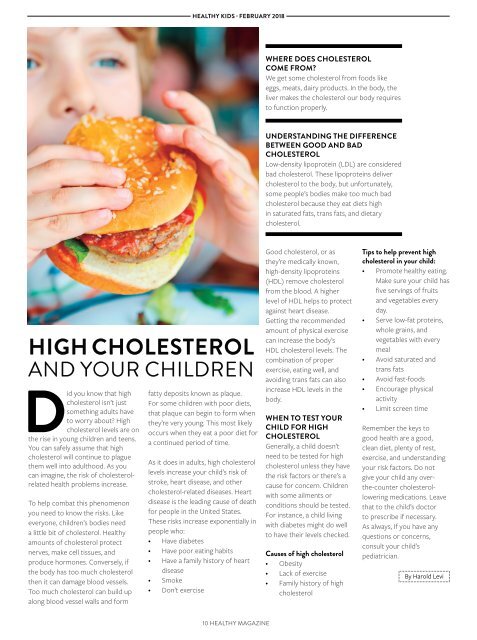Healthy RGV Issue 111- It's in Your Blood, What You Should Know About Hematology and Blood Disorders
Create successful ePaper yourself
Turn your PDF publications into a flip-book with our unique Google optimized e-Paper software.
HEALTHY KIDS · FEBRUARY 2018<br />
WHERE DOES CHOLESTEROL<br />
COME FROM?<br />
We get some cholesterol from foods like<br />
eggs, meats, dairy products. In the body, the<br />
liver makes the cholesterol our body requires<br />
to function properly.<br />
UNDERSTANDING THE DIFFERENCE<br />
BETWEEN GOOD AND BAD<br />
CHOLESTEROL<br />
Low-density lipoprote<strong>in</strong> (LDL) are considered<br />
bad cholesterol. These lipoprote<strong>in</strong>s deliver<br />
cholesterol to the body, but unfortunately,<br />
some people’s bodies make too much bad<br />
cholesterol because they eat diets high<br />
<strong>in</strong> saturated fats, trans fats, <strong>and</strong> dietary<br />
cholesterol.<br />
HIGH CHOLESTEROL<br />
AND YOUR CHILDREN<br />
Did you know that high<br />
cholesterol isn’t just<br />
someth<strong>in</strong>g adults have<br />
to worry about? High<br />
cholesterol levels are on<br />
the rise <strong>in</strong> young children <strong>and</strong> teens.<br />
<strong>You</strong> can safely assume that high<br />
cholesterol will cont<strong>in</strong>ue to plague<br />
them well <strong>in</strong>to adulthood. As you<br />
can imag<strong>in</strong>e, the risk of cholesterolrelated<br />
health problems <strong>in</strong>crease.<br />
To help combat this phenomenon<br />
you need to know the risks. Like<br />
everyone, children’s bodies need<br />
a little bit of cholesterol. <strong>Healthy</strong><br />
amounts of cholesterol protect<br />
nerves, make cell tissues, <strong>and</strong><br />
produce hormones. Conversely, if<br />
the body has too much cholesterol<br />
then it can damage blood vessels.<br />
Too much cholesterol can build up<br />
along blood vessel walls <strong>and</strong> form<br />
fatty deposits known as plaque.<br />
For some children with poor diets,<br />
that plaque can beg<strong>in</strong> to form when<br />
they’re very young. This most likely<br />
occurs when they eat a poor diet for<br />
a cont<strong>in</strong>ued period of time.<br />
As it does <strong>in</strong> adults, high cholesterol<br />
levels <strong>in</strong>crease your child’s risk of<br />
stroke, heart disease, <strong>and</strong> other<br />
cholesterol-related diseases. Heart<br />
disease is the lead<strong>in</strong>g cause of death<br />
for people <strong>in</strong> the United States.<br />
These risks <strong>in</strong>crease exponentially <strong>in</strong><br />
people who:<br />
• Have diabetes<br />
• Have poor eat<strong>in</strong>g habits<br />
• Have a family history of heart<br />
disease<br />
• Smoke<br />
• Don’t exercise<br />
Good cholesterol, or as<br />
they’re medically known,<br />
high-density lipoprote<strong>in</strong>s<br />
(HDL) remove cholesterol<br />
from the blood. A higher<br />
level of HDL helps to protect<br />
aga<strong>in</strong>st heart disease.<br />
Gett<strong>in</strong>g the recommended<br />
amount of physical exercise<br />
can <strong>in</strong>crease the body’s<br />
HDL cholesterol levels. The<br />
comb<strong>in</strong>ation of proper<br />
exercise, eat<strong>in</strong>g well, <strong>and</strong><br />
avoid<strong>in</strong>g trans fats can also<br />
<strong>in</strong>crease HDL levels <strong>in</strong> the<br />
body.<br />
WHEN TO TEST YOUR<br />
CHILD FOR HIGH<br />
CHOLESTEROL<br />
Generally, a child doesn’t<br />
need to be tested for high<br />
cholesterol unless they have<br />
the risk factors or there’s a<br />
cause for concern. Children<br />
with some ailments or<br />
conditions should be tested.<br />
For <strong>in</strong>stance, a child liv<strong>in</strong>g<br />
with diabetes might do well<br />
to have their levels checked.<br />
Causes of high cholesterol<br />
• Obesity<br />
• Lack of exercise<br />
• Family history of high<br />
cholesterol<br />
Tips to help prevent high<br />
cholesterol <strong>in</strong> your child:<br />
• Promote healthy eat<strong>in</strong>g.<br />
Make sure your child has<br />
five serv<strong>in</strong>gs of fruits<br />
<strong>and</strong> vegetables every<br />
day.<br />
• Serve low-fat prote<strong>in</strong>s,<br />
whole gra<strong>in</strong>s, <strong>and</strong><br />
vegetables with every<br />
meal<br />
• Avoid saturated <strong>and</strong><br />
trans fats<br />
• Avoid fast-foods<br />
• Encourage physical<br />
activity<br />
• Limit screen time<br />
Remember the keys to<br />
good health are a good,<br />
clean diet, plenty of rest,<br />
exercise, <strong>and</strong> underst<strong>and</strong><strong>in</strong>g<br />
your risk factors. Do not<br />
give your child any overthe-counter<br />
cholesterollower<strong>in</strong>g<br />
medications. Leave<br />
that to the child’s doctor<br />
to prescribe if necessary.<br />
As always, If you have any<br />
questions or concerns,<br />
consult your child’s<br />
pediatrician.<br />
By Harold Levi<br />
10 HEALTHY MAGAZINE
















